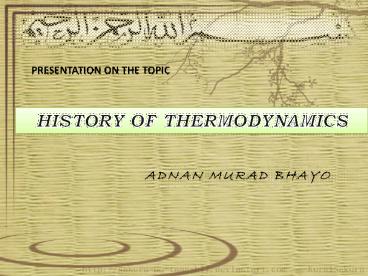History of thermodynamics PowerPoint PPT Presentation
Title: History of thermodynamics
1
PRESENTATION ON THE TOPIC
HISTORY OF THERMODYNAMICS
ADNAN MURAD BHAYO
2
Before 1800
3
OTTO VON GUERICKE
His major scientific achievements were the
establishment of the physics of vacuums, the
discovery of an experimental method for clearly
demonstrating electrostatic repulsion, and his
advocacy of the reality of "action at a distance"
and of "absolute space"
4
ROBERT BOYLE
Founders of modern chemistry, and one of the
pioneers of modern experimental scientific
method. He is best known for Boyle's law, which
describes the inversely proportional relationship
between the absolute pressure and volume of a
gas, if the temperature is kept constant within
a closed system
5
THOMAS SAVERAY
He is famous for his invention of the first
commercially used steam powered engine
6
GUILLAURNE AMANTONS
He came close to finding absolute zero. Absolute
zero is the lower limit of the thermodynamic
temperature scale, a state at which
the enthalpy and entropy of a cooled ideal
gas reaches its minimum value, taken as 0.
7
JOSEPH BLACK
Introduced term Latent Heat (Latent heat is
energy released or absorbed, by a body or a
thermodynamic system, during a constant-temperatur
e process) and specific heat (The specific
heat is the amount of heat per unit mass required
to raise the temperature by one degree Celsius)
8
1800-1847
9
JOHN LESLIE
Sir John Leslie observes that, black surface
radiates heat more effectively than a polished
surface, suggesting the importance of black body
radiation
10
ROBERT BROWN
He introduced a word Brownian Motion. Brownian
motion is the random motion of particles suspended
in a fluid (a liquid or a gas) resulting from
their collision with the quick atoms or molecules
in the gas or liquid
11
JOSEPH LOSSAC
Gay-Lussac first formulated the law, Gay-Lussac's
Law, stating that if the mass and volume of a
gas are held constant then gas pressure increases
linearly as the temperature rises
12
EMILE CLAPEYRON
Emile Clapeyron popularises Carnot's work through
a graphical and analytic formulation. He also
combined Boyle's Law, Charles's Law,
and Gay-Lussac's Law to produce a Combined Gas
Law PV/T k
13
HENRI VICTOR
Henri Victor Regnault added Avogadro's Law to
the Combined Gas Law to produce the Ideal Gas
Law PV nRT
14
1848-1948
15
WILLIUM RANKINE
Introduce thermodynamic function, later
identified as entropy (a measure of the number of
specific ways in which a thermodynamic system may
be arranged, commonly understood as a measure of
disorder )
16
RUDOLPH CLAUSIUS
Central founders of the science of thermodynamics.
By his restatement of Sadi Carnot's principle
known as the Carnot cycle, he put the theory of
heat
17
VAN DER WAAL
Well known due to van der Waal's equation (this
equation is the sum of the attractive or
repulsive forces between molecules (or between
parts of the same molecule) other than those due
to covalent bonds, or the electrostatic
interaction of ions with one another, with
neutral molecules, or with charged molecules).
18
HENRY LOUIS
He is well known by his principle called as
LECHATLIERS PRINCIPLE ( When a system at
equilibrium is subjected to change
in concentration, temperature, volume,
or pressure, then the system re-adjusts itself to
(partially) counteract the effect of the applied
change and a new equilibrium is established)
19
WALTER NERNST
Relates the voltage of electrochemical cells to
their chemical thermodynamics Nernst equation is
an equation that relates the reduction
potential of a half cell (or the total voltage,
i.e. the electromotive force, of the full cell)
at any point in time to the standard electrode
potential, temperature, activity, and reaction
quotient of the underlying reactions and species
used.
20
STEPHEN HAWKING
One of the most eminent scientist after
Einstein. Stephen Hawking predicts that black
holes will radiate particles with a black-body
spectrum which can cause black hole evaporation
21
(No Transcript)

